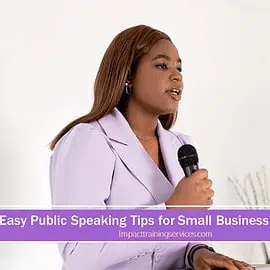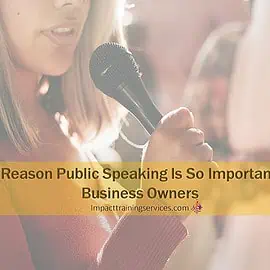Last Updated on April 4, 2024 by Lorna Barrow

Wow! Do I have a story to tell! And I love storytelling!
Believe it or not, those were the opening words of my presentation on “Accounting in Your Small Business” presented to a group of small business owners.
After I said those words (with the appropriate body language and vocal variety of course) everyone put down their glasses and focused on me like a laser.
Naturally I delivered. You see, I was applying my storytelling skills… another one of my business solutions.
I told them the story of how I decided I wanted to be the Accountant to small businesses. Yep, my enthusiasm for this was high.
I had identified my niche and I was helping people while making money for myself. What more could a girl ask for?
My first client was equally enthusiastic.
He had not done his accounts from the time he had started the business 4 years ago. He was getting more and more anxious about his bookkeeping.
What! a new Accountant willing to work for me…what more could a boy ask for?
I asked him to just drop of the documents. And he did…in three large Cornflakes cartoons!
Now that I’ve used my storytelling to get your attention…
Telling a story, especially about a personal experience, is the best way I know for you to connect with your audience.
Stories help your audience to visualize circumstances, understand complex information and let you hook them with emotion.
Above all, having good stories you can tell, actually builds your confidence before you speak.
Not to mention that they really help people to remember what they have heard.
So what is the best approach to storytelling? Here’re some tips to help you.
1. Remember we’re all storytellers
Most of the information we share is in the form of stories.
Storytelling is the “narrative” telling of an event or experience.
It links events in some kind of logical and believable sequence.
Isn’t that what we do most of the time? We remember our experiences in the form of stories and that is how we share them.
And we can’t let our unreasonable fear of public speaking get in our way.
2. Fit your stories to the context of your speech
When you are making a presentation or giving a speech, your stories should fit in with context of your presentation.
Telling an unrelated story just because you like it will have the opposite impact of what you intend.
You see, the human mind has a need for closure, and if it can’t make the connection between your story and the rest of your speech, you will be remembered for the wrong reasons.
3. Make your stories relevant to the experience and interests of your audience
Each story should have a point to it that your listeners can easily grasp and readily identify with.
If they need Sherlock Holmes to help them to find out what was the point your story wanted to make, they will have a story to tell about you.
Improving your public speaking as much as you can will help you with this.
4. Understand what makes a good story
- It is short, two to three minute at the most
- It paints a picture
- It highlights information it does not replace it
- Something should happen in a good story
- It should have at least one character
5. Tell stories that you’re comfortable telling
However good a story is, however well you think it supports the point, if you cannot tell it with sincerity, it will not achieve its purpose.
You can take your public speaking to the highest level and learn how to tell stories. I did.
But I speak everyday for a living and I just love to tell stories!
6. Use stories sparingly
Can you imagine what your meal would be like if at dinner, the chef sprinkled ice cream toppings over everything?
Well telling a story to illustrate every point will have the same effect on your audience.
7. Remember to work on your storytelling
The best stories are the ones which remain with the audience long after your speech.
So, when you’re telling a story, put some feeling and enthusiasm into it!
After all, you’re telling a story not reciting serial numbers for your appliances.
Your eye contact, vocal variety, body language, gestures, posture are all very important to the delivery of your everlasting story.
8. Practice your story along with the rest of your speech
Unless you’re an experienced speaker, do practice your stories along with your speech.
You do practice your speeches, don’t you?
Practice helps to fix the story in your mind and you don’t want to spoil an otherwise good speech by “bumbling” a story.
Now..over to you
I believe that if you put those 8 tips to good use when you want to use storytelling in your public speaking, your speeches will improve tremendously.
As for my career as Accountant to the Small Business Stars…it began and ended with those cornflakes cartoons.
And that’s the story of how I became a Business Breakthrough Specialist!
Now, if you have any of your own tips on storytelling, please share them with us, won’t you…



